外研版(2019)选择性必修第一册Unit 1 Laugh out loud! Using language 课件(共45张PPT)
文档属性
| 名称 | 外研版(2019)选择性必修第一册Unit 1 Laugh out loud! Using language 课件(共45张PPT) | 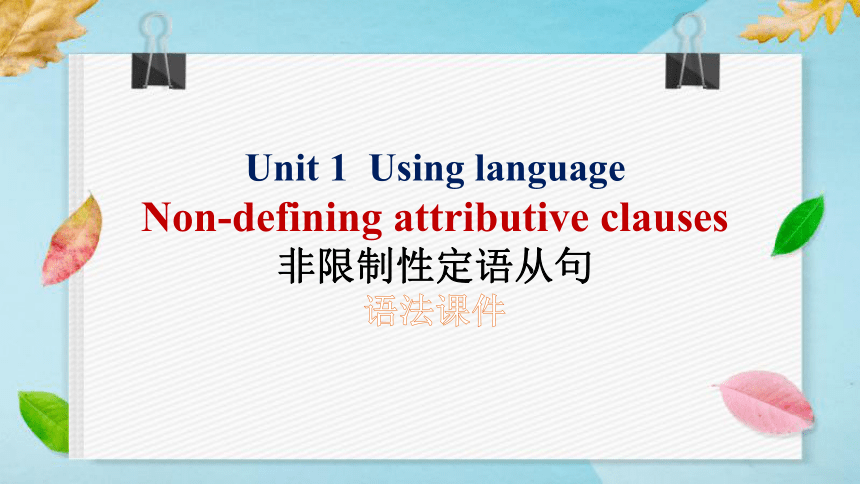 | |
| 格式 | pptx | ||
| 文件大小 | 28.2MB | ||
| 资源类型 | 教案 | ||
| 版本资源 | 外研版(2019) | ||
| 科目 | 英语 | ||
| 更新时间 | 2024-10-11 15:07:44 | ||
图片预览

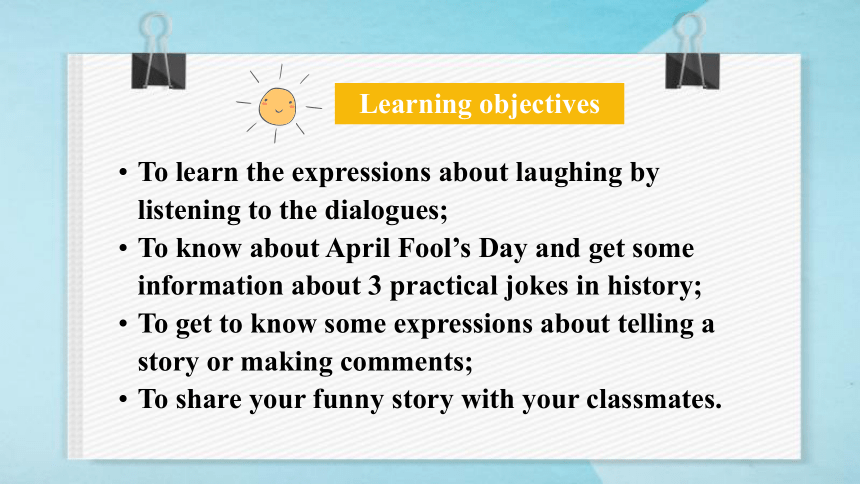
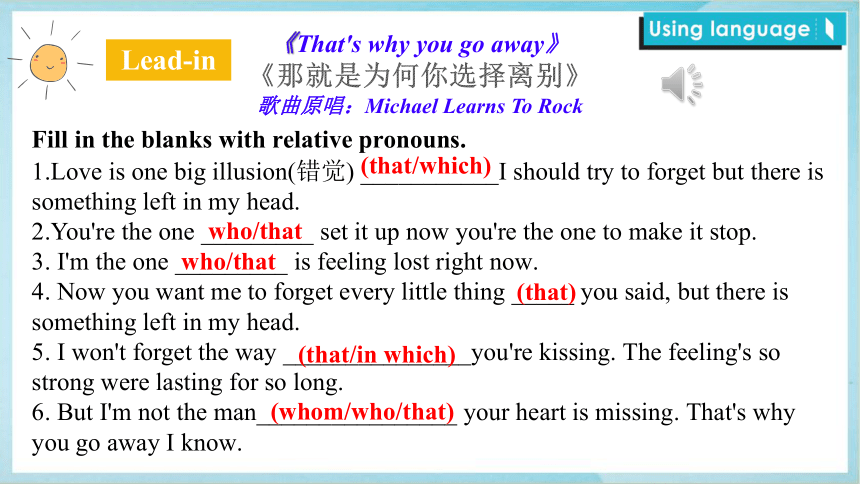
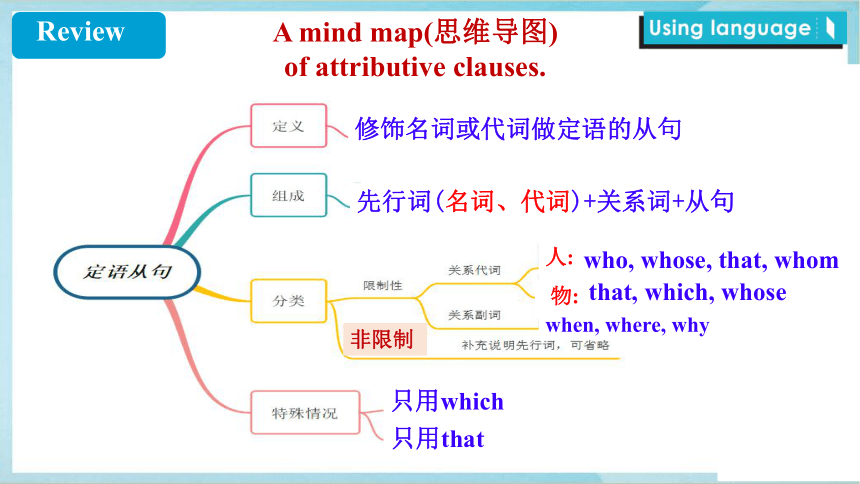
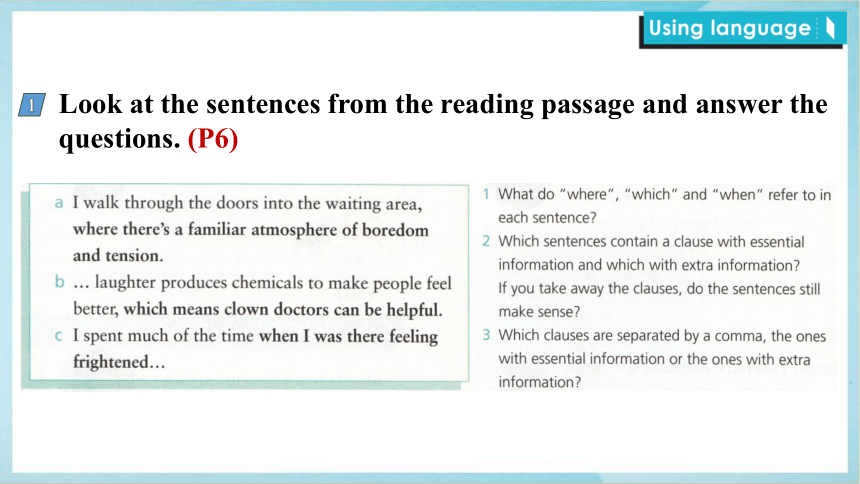
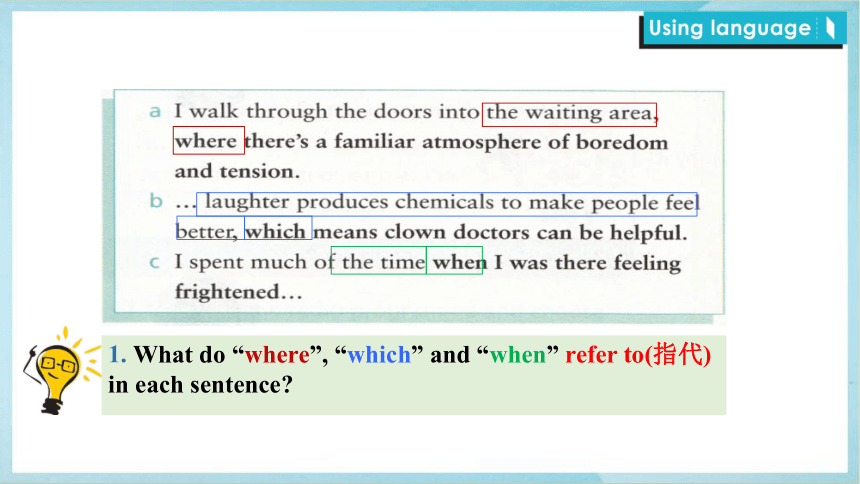
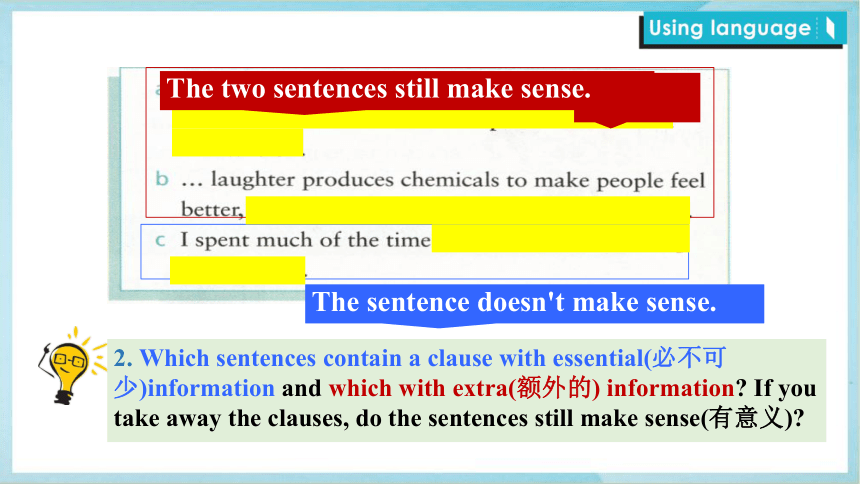
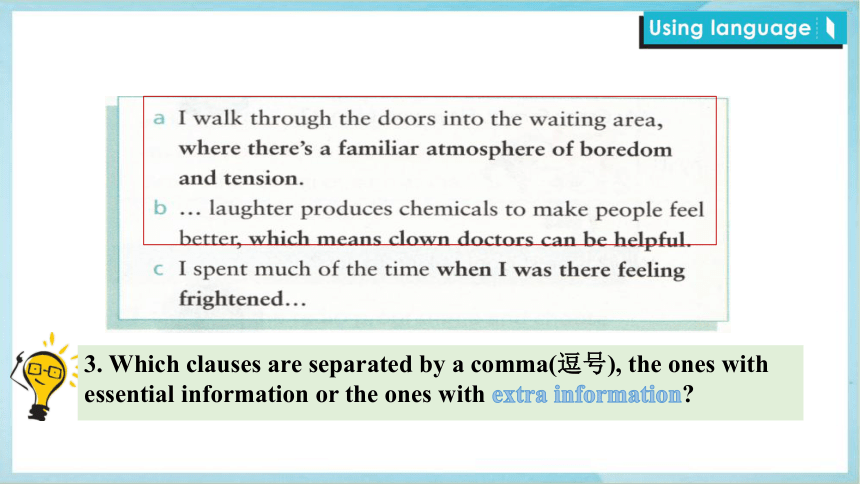
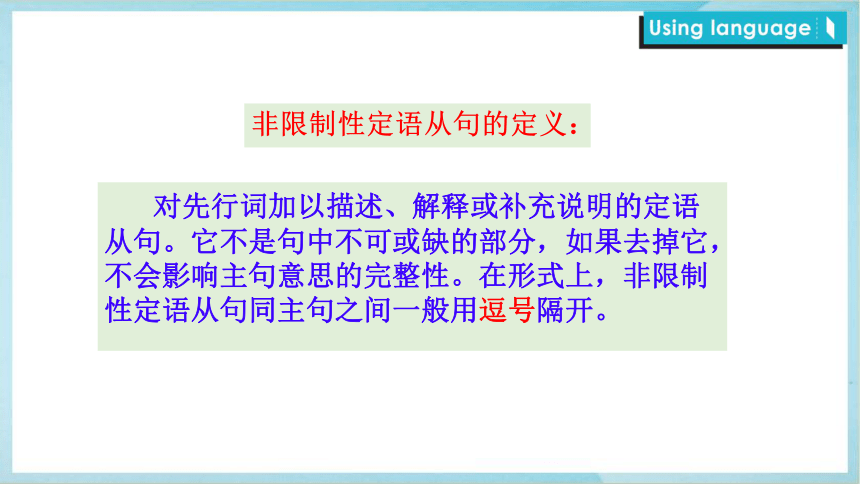

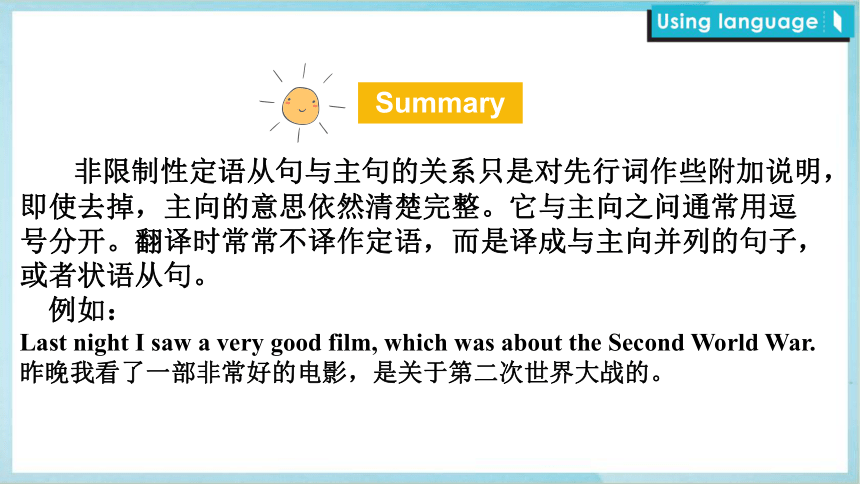
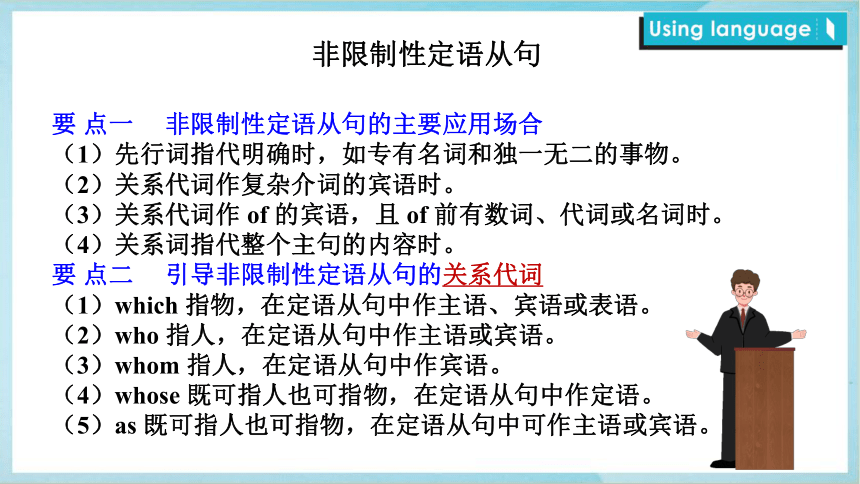
文档简介
(共45张PPT)
Unit 1 Using language
Non-defining attributive clauses
非限制性定语从句
语法课件
To learn the expressions about laughing by listening to the dialogues;
To know about April Fool’s Day and get some information about 3 practical jokes in history;
To get to know some expressions about telling a story or making comments;
To share your funny story with your classmates.
Learning objectives
1.Love is one big illusion(错觉) ___________I should try to forget but there is something left in my head.
2.You're the one _________ set it up now you're the one to make it stop.
3. I'm the one _________ is feeling lost right now.
4. Now you want me to forget every little thing _____ you said, but there is something left in my head.
5. I won't forget the way _______________you're kissing. The feeling's so strong were lasting for so long.
6. But I'm not the man________________ your heart is missing. That's why you go away I know.
Fill in the blanks with relative pronouns.
《That's why you go away》
《那就是为何你选择离别》
歌曲原唱:Michael Learns To Rock
(whom/who/that)
(that/in which)
(that)
who/that
who/that
(that/which)
Lead-in
Review
只用which
只用that
A mind map(思维导图) of attributive clauses.
人:
物:
who, whose, that, whom
先行词(名词、代词)+关系词+从句
修饰名词或代词做定语的从句
when, where, why
that, which, whose
非限制
Look at the sentences from the reading passage and answer the questions. (P6)
1
1. What do “where”, “which” and “when” refer to(指代) in each sentence
The sentence doesn't make sense.
The two sentences still make sense.
2. Which sentences contain a clause with essential(必不可少)information and which with extra(额外的) information If you take away the clauses, do the sentences still make sense(有意义)
3. Which clauses are separated by a comma(逗号), the ones with essential information or the ones with extra information
对先行词加以描述、解释或补充说明的定语从句。它不是句中不可或缺的部分,如果去掉它,不会影响主句意思的完整性。在形式上,非限制性定语从句同主句之间一般用逗号隔开。
非限制性定语从句的定义:
Para. 1
Para. 2
Para. 4
Now look for more sentences with non-defining attributive clauses in the reading passage(P2-4), and summarise their uses.(P6)
We have to be very sensitive and work closely with the doctors and nurses, who keep us updated on each patient.
People sit uncomfortably on plastic chairs, looking through old magazines, all of which have been read hundreds of times previously.
I speak with the on-duty nurse, who tells me that Lara’s parents rushed her to the hospital after she fell off her bicycle.
非限制性定语从句与主句的关系只是对先行词作些附加说明,即使去掉,主向的意思依然清楚完整。它与主向之问通常用逗号分开。翻译时常常不译作定语,而是译成与主向并列的句子,或者状语从句。
例如:
Last night I saw a very good film, which was about the Second World War.
昨晚我看了一部非常好的电影,是关于第二次世界大战的。
Summary
非限制性定语从句
要 点一 非限制性定语从句的主要应用场合
(1)先行词指代明确时,如专有名词和独一无二的事物。
(2)关系代词作复杂介词的宾语时。
(3)关系代词作 of 的宾语,且 of 前有数词、代词或名词时。
(4)关系词指代整个主句的内容时。
要 点二 引导非限制性定语从句的关系代词
(1)which 指物,在定语从句中作主语、宾语或表语。
(2)who 指人,在定语从句中作主语或宾语。
(3)whom 指人,在定语从句中作宾语。
(4)whose 既可指人也可指物,在定语从句中作定语。
(5)as 既可指人也可指物,在定语从句中可作主语或宾语。
要 点三 引导非限制性定语从句的关系副词
(1)where 在定语从句中作地点状语。
(2)when 在定语从句中作时间状语。
单句语法填空
(1) He will put off the picnic until May 1st, he will be free.
(2) We will be shown around the city:schools,museums and other places,_______ other visitors seldom go.
要 点四 注意事项
(1)在 which,as 引导的非限制性定语从句中,关系代词 which,as 都表示一个整体概念。 所以当它们在定语从句中作主语时,其谓语动词总是用单数形式。
(2)as 引导非限制性定语从句时,先行词是整个主句。从句可位于主句前或主句后,也可位于主句中间。as 引导的定语从句表示说话人的看法、态度或评论,as 仍具有“正如,像”等意思。
(3)which 引导非限制性定语从句时,先行词既可以是一个词,也可以是整个主句或主句的部分内容。which 引导的定语从句只能位于主句的后面。which 引导的定语从句对主句叙述的内容进行补充说明,常译为“这一点,这件事”等。
when
where
单句语法填空
(1) The couple were invited to the state banquet, was a great honour to them.
(2) was often the case,she forgot to bring her homework.
(3) This man, you know,is good for nothing.
(4) These apple trees, I planted three years ago,have not produced any fruits.
(5) He said that he had never seen her before, was not true.
单句写作
(6) He was a foreigner, (我是从他的口音知道的).
(7) John passed the exam, (这使他的父母非常开心).
(8) (美国人都知道),Mark Twain is a great American writer.
which
As
as
which
which
as I knew from his accent
which made his parents very happy
As is known to the Americans
要 点五 限制性定语从句与非限制性定语从句的区别
(1)形式不同:
前者紧跟在先行词后,不用逗号隔开;而后者用逗号和主句隔开。
(2)功能不同:
前者起限定作用,不可省略,否则主句意思不完整;而后者起补充说明作用,省略后主句意思仍然完整。
(3)关系词不同:
前者所有关系词都可引导,在从句中作宾语时可省略;而后者 that,why 不能引导,且均不可省略。
(4)先行词不同:
前者的先行词往往是某一个词;而后者的先行词可以是一个词,也可以是主句的一部分,甚至是整个主句。
(5)翻译方式不同:
前者一般译为定语,而后者一般译为并列分句
单句语法填空
(1) The man I met in the street was an employer from a famous company.
(2) Last night I saw a very good film, was about the great thinker,Confucius.
(3) [词汇复现]The book, cover is red,is about entertainment.
(4) This is the soldier saved the boy in the flood.
(5) These men were thieves, turned out to be true.
(6) Charles Smith, was my former teacher,resigned last year.
(7) The next day we arrived in New York, we were interviewed on the radio.
(8) The National Day falls on October 1st, he was born.
(9) is known to us all,Taiwan belongs to China.
(10) Do you have the photo we took together in our primary school
which
which
that/which
that/who/whom
whose
that/who
who
where
when
As
2
Read the passage and rewrite the tips using non-defining attributive clauses.(P6)
SECRETS TO HAPPINESS
Achieving a positive state of mind isn't easy for everyone. But there are ways to maintain a healthy mind even during times of difficulty.
幸福的秘诀
对于每个人来说,获得积极的心态并不容易。但即使在困难时期,也有方法保持健康的心态。
Check the answers
Go for a walk in the countryside, where you can enjoy the beautiful views and a peaceful atmosphere.
Check the answrs
Spend time with your family and friends, which will activate chemicals in your brain to make you feel happier.
Try to accept your mistakes, where / through which you can learn a lot.
Check the answers
Close your eyes and picture the future, where you’ve made your dreams come true.
Check the answers
Complete the joke with the sentence parts in the box using who / which and put commas in the correct position.(P7)
3
One day, Sherlock Holmes and Dr Watson go camping. They put up their tent under the stars and go to sleep. Suddenly, in the middle of the night, Watson is woken up by Holmes1______________________.
“Watson,” Holmes says, “look up at the stars, and tell me what they tell you." Not quite sure what he means, Watson thinks Holmes is joking 2___________________
, which he finds annoying
, who is lying next to him
Check the answers
4______________________________ shouts, “Watson, look around you! Use your eyes! Somebody’s stolen our tent!”
at this time of night. Even so, he replies, “I see millions of stars and it’s quite likely there are some planets like Earth. And if so, this means that there might also be life on other planets.” Watson is pleased with his answer 3________________________________. But Holmes
, who has lost his patience by now
, which he thinks will impress Holmes
Think of a joke you find funny and write it down using non-defining attributive clauses where appropriate. Then share your joke with the class.(P7)
4
A:I'd like to tell you about an funny thing that happened to me yesterday, which was unbelievable to me.
B: Oh, really
A: Yes. It happened so strange that I didn't realize it at the time.
B: You're saying it didn't happen the way you thought it would, which you figured it out later
A: Yeah, you got it! ...
Fun time!
Listen and complete the conversations. (P7)
Why are you grinning from 1 ____________
I’ve won a free cinema ticket.
Cool! What are you going to watch
My Crazy Family. Have you seen it
Yes! I laughed my 2 _________. You’ll enjoy it!
A: Why are you grinning from ear to ear
B: I’ve won a free cinema ticket.
A: Cool! What are you going to watch
B: My Crazy Farmily. Have you seen it
A: Yes! I laughed my head off. You’ll enjoy it!
Tapescripts
ear to ear
head off
Conversation 1
I really don’t get Harry.
Why Is he still not talking to you
No. Today, he was all 3 ___________.
He asked me to help him with that website of his.
Really What did you say
Well, I said yes. We all deserve a second chance, I guess.
A:I really don’t get Harry.
B: Why Is he still not talking to you
A: Well... Today, he was all smiles and asked me to help him with
that website of his.
B: Really What did you say
A: Well, I said yes. We all deserve a second chance, I guess.
Tapescripts
smiles
Conversation 2
What’s the matter Why the long face
Yesterday, I stepped on a banana skin and fell
over in front of the whole class.
That’s so funny!
I was the 4 __________ stock of the class.
Even my teacher cracked 5 ___________.
laughing
a smile
A: What’s the matter Why the long face
B: Yesterday, I stepped on a banana skin and fell over in front of the whole class.
A: That’s so funny!
B: I was the laughing stock of the class. Even my teacher cracked a smile!
Tapescripts
Conversation 3
Match the expressions you have completed in Activity 5 to their meanings.(P8)
________________: a person that everyone laughs at because they have done something funny or silly
________________: to look friendly and happy, especially when other people are not expecting you to
________________: to look extremely happy because you are very pleased about something
________________: to smile slightly
________________: to laugh very loudly and for a long time
grin from ear to ear
laugh one’s head off
be all smiles
laughing stock
crack a smile
Work in pairs. Discuss other situations in which you could use these expressions.(P8)
grin from ear to ear
laugh one’s head off
be all smiles
laughing stock
crack a smile
Did you know
April Fool's Day is on I April. It's the one day of the year when people in many parts of the world play practical jokes on each other. Even newspapers, radio and TV stations play tricks on their readers and audiences. The jokes traditionally last until noon in the UK. But in some other countries, such as the US, they can last all day!
愚人节是每年的 4 月 1 日。在这一天,世界许多地方的人们会互相开一些善意的玩笑。甚至报纸、广播和电视台也会和他们的读者和观众开一些玩笑。在英国,这些玩笑传统上会持续到中午。但在其他国家,比如美国,这些玩笑可能会持续一整天!
Listen to the radio programme and choose the pictures mentioned.(P8)
√
√
√
Karen: Hi, I’m Karen and this is “Fun Time”. I’m joined today by Mark Cllin. Hi, Mark.
Mark: Hello!
Karen: As you know, today is the 1st of April or, as we call it, April Fool’s Day, and Mark’s here to tell us about three of the best practical jokes in history.
Mark: Indeed. Let’s start with the oldest recorded April Fool’s joke, which took place on the 1st of April 1698. Some people were told to go to the Tower of London to watch “the washing of the lions”. Of course, there were no lions at the Tower of London. This was reported in a newsletter - similar to today’s newspapers - on the second of April that year. Apparently, this practical joke worked so well that it was played on visitors throughout the 18th and 19th centuries.
Karen: Well, I’d be pretty annoyed if someone did that to me. OK, let’s hear the next one.
Mark: OK. This is a practical joke from 1965. The BBC News Channel invited a university professor to talk about his invention called “Smellovision”.
Karen: Smell-o-what
Mark: Smellovision! This was a type of machine that allowed smells to be carried over the airwaves. During the interview, the BBC showed images of people actually smelling aTV screen!
Tapescripts
d
c
c
Karen: But I don’t get it... How on earth did people actually believe that there was such a thing as “Smellovision”
Mark: The professor did a demonstration. He placed coffee beans and onions inside the Smellovision and asked people watching the programme at home to phone him if they could smell anything. And people did! Some really believed they could smell the coffee beans and onions. Some even said that the onions made their eyes water!
Karen: I see... I guess you can convince yourself of anything if you really want to.
Mark: Indeed! Now, my favourite one. The “spaghetti tree” joke.
Karen: Oh,I know it! It’s a good one!
Mark: It’s another BBC joke and probably the most famous one. On the 1st of April 1957, a news programme told viewers that the spagheti trees in Switzerland were having a really good harvest. The programme even showed people picking spagheti off trees and laying it in the sun to dry.
Karen: That’s so funny!
Mark: Many people fell for the joke because spaghetti wasn’t that common in England a the time.
Karen: I can imagine!
Tapescripts
a
Listen again and complete the notes.(P9)
Joke 1
● Year: 1698
● Main story: A newsletfer reported people going to watch 1 _____________ at the Tower of London. The joke was played on visitors throughout the 2 ________________.
Joke 2
● Year: 3 ________________
● Main story: The 4 ________________ introduced an invention called “Smellovision”. It allowed 5 ________________ over the airwaves.
Joke 3
● Year: 6 ________________
● Main story: A news programme told viewers that the spaghetti trees in Switzerland Were having 7 ________________.
Joke 1
● Year: 1698
● Main story: A newsletfer reported people going to watch 1 ________________ at the Tower of London. The joke was played on visitors throughout the 2 __________________.
“the washing of the lions”
18th and 19th centuries
Tapescripts
Mark: Indeed. Let’s start with the oldest recorded April Fool’s joke, which took place on the 1st of April 1698. Some people were told to go to the Tower of London to watch “the washing of the lions”. Of course, there were no lions at the Tower of London. This was reported in a newsletter - similar to today’s newspapers - on the second of April that year. Apparently, this practical joke worked so well that it was played on visitors throughout the 18th and 19th centuries.
Joke 2
● Year: 3 ________
● Main story: The 4 ___________________ introduced an invention called “Smellovision”. It allowed 5 ____________________ over the airwaves.
Tapescripts
Mark: OK. This is a practical joke from 1965. The BBC News Channel invited a university professor to talk about his invention called “Smellovision”.
Karen: Smell-o-what
Mark: Smellovision! This was a type of machine that allowed smells to be carried over the airwaves. During the interview, the BBC showed images of people actually smelling aTV screen!
1965
BBC News Channel
smells to be carried
Joke 3
● Year: 6 ________
● Main story: A news programme told viewers that the spaghetti trees in Switzerland Were having 7 _______________________.
Tapescripts
Mark: Indeed! Now, my favourite one. The “spaghetti tree” joke.
Karen: Oh,I know it! It’s a good one!
Mark: It’s another BBC joke and probably the most famous one. On the 1st of April 1957, a news programme told viewers that the spagheti trees in Switzerland were having a really good harvest. The programme even showed people picking spagheti off trees and laying it in the sun to dry.
1957
a really good harvest
Now work in pairs. Discuss which of the practical jokes you think is funny.
Complete the boxes with expressions from the radio programme.(P9)
Let’s start with… It’s a good one!
I don’t get it. That’s so funny!
Now, my favourite one... I can imagine!
Let’s start with…
Now, my favourite one...
It’s a good one!
I don’t get it.
That’s so funny!
I can imagine!
Work in pairs. Tell each other a funny story and make comments using the expressions in this section.(P9)
Let’s start with…
Now, my favourite one...
It’s a good one!
I don’t get it.
That’s so funny!
I can imagine!
Now give feedback on each other’s stories and help your partner to improve theirs.
Exercise
(1) I lost a book, _______ I can't remember now.
A. whose title B. its title
C. the title of it D. the title of that
(2) Last summer we visited the West Lake, _______ Hangzhou is famous in the world.
A. for which B. for that
C. in which D. what
Exercise
(3) This machine, _______for many years, is still working perfectly.
A. after which I have looked B. which I have looked after
C. that I have looked after D. I have looked after
(4) He is working hard, _______will make him pass the final exam.
A. that B. which
C. for which D. who
Exercise
(5) My neighbours used to give me a hand in time of trouble, _______ was very kind of them.
A. who B. which
C. that D. it
(6) I shall never forget those years _______ I lived on the farm with farmers, _______ has a great effect on my life.
A. when; who B. that; which
C. which; that D. when; which
Exercise
(7) The clever boy made a hole in the wall, _______ he could see_______ was going on inside house,
A. which; what B. through which; what
C. through that; what D. what; that
(8) I have bought two ball pens, _______writes well.
A. none of them B. neither of them
C. neither of which D. none of which
Think of a joke you find funny and write it down using non-defining attributive clauses where appropriate. Share your joke with the class.
Review what you’ve learnt in this class.
Homework
Unit 1 Using language
Non-defining attributive clauses
非限制性定语从句
语法课件
To learn the expressions about laughing by listening to the dialogues;
To know about April Fool’s Day and get some information about 3 practical jokes in history;
To get to know some expressions about telling a story or making comments;
To share your funny story with your classmates.
Learning objectives
1.Love is one big illusion(错觉) ___________I should try to forget but there is something left in my head.
2.You're the one _________ set it up now you're the one to make it stop.
3. I'm the one _________ is feeling lost right now.
4. Now you want me to forget every little thing _____ you said, but there is something left in my head.
5. I won't forget the way _______________you're kissing. The feeling's so strong were lasting for so long.
6. But I'm not the man________________ your heart is missing. That's why you go away I know.
Fill in the blanks with relative pronouns.
《That's why you go away》
《那就是为何你选择离别》
歌曲原唱:Michael Learns To Rock
(whom/who/that)
(that/in which)
(that)
who/that
who/that
(that/which)
Lead-in
Review
只用which
只用that
A mind map(思维导图) of attributive clauses.
人:
物:
who, whose, that, whom
先行词(名词、代词)+关系词+从句
修饰名词或代词做定语的从句
when, where, why
that, which, whose
非限制
Look at the sentences from the reading passage and answer the questions. (P6)
1
1. What do “where”, “which” and “when” refer to(指代) in each sentence
The sentence doesn't make sense.
The two sentences still make sense.
2. Which sentences contain a clause with essential(必不可少)information and which with extra(额外的) information If you take away the clauses, do the sentences still make sense(有意义)
3. Which clauses are separated by a comma(逗号), the ones with essential information or the ones with extra information
对先行词加以描述、解释或补充说明的定语从句。它不是句中不可或缺的部分,如果去掉它,不会影响主句意思的完整性。在形式上,非限制性定语从句同主句之间一般用逗号隔开。
非限制性定语从句的定义:
Para. 1
Para. 2
Para. 4
Now look for more sentences with non-defining attributive clauses in the reading passage(P2-4), and summarise their uses.(P6)
We have to be very sensitive and work closely with the doctors and nurses, who keep us updated on each patient.
People sit uncomfortably on plastic chairs, looking through old magazines, all of which have been read hundreds of times previously.
I speak with the on-duty nurse, who tells me that Lara’s parents rushed her to the hospital after she fell off her bicycle.
非限制性定语从句与主句的关系只是对先行词作些附加说明,即使去掉,主向的意思依然清楚完整。它与主向之问通常用逗号分开。翻译时常常不译作定语,而是译成与主向并列的句子,或者状语从句。
例如:
Last night I saw a very good film, which was about the Second World War.
昨晚我看了一部非常好的电影,是关于第二次世界大战的。
Summary
非限制性定语从句
要 点一 非限制性定语从句的主要应用场合
(1)先行词指代明确时,如专有名词和独一无二的事物。
(2)关系代词作复杂介词的宾语时。
(3)关系代词作 of 的宾语,且 of 前有数词、代词或名词时。
(4)关系词指代整个主句的内容时。
要 点二 引导非限制性定语从句的关系代词
(1)which 指物,在定语从句中作主语、宾语或表语。
(2)who 指人,在定语从句中作主语或宾语。
(3)whom 指人,在定语从句中作宾语。
(4)whose 既可指人也可指物,在定语从句中作定语。
(5)as 既可指人也可指物,在定语从句中可作主语或宾语。
要 点三 引导非限制性定语从句的关系副词
(1)where 在定语从句中作地点状语。
(2)when 在定语从句中作时间状语。
单句语法填空
(1) He will put off the picnic until May 1st, he will be free.
(2) We will be shown around the city:schools,museums and other places,_______ other visitors seldom go.
要 点四 注意事项
(1)在 which,as 引导的非限制性定语从句中,关系代词 which,as 都表示一个整体概念。 所以当它们在定语从句中作主语时,其谓语动词总是用单数形式。
(2)as 引导非限制性定语从句时,先行词是整个主句。从句可位于主句前或主句后,也可位于主句中间。as 引导的定语从句表示说话人的看法、态度或评论,as 仍具有“正如,像”等意思。
(3)which 引导非限制性定语从句时,先行词既可以是一个词,也可以是整个主句或主句的部分内容。which 引导的定语从句只能位于主句的后面。which 引导的定语从句对主句叙述的内容进行补充说明,常译为“这一点,这件事”等。
when
where
单句语法填空
(1) The couple were invited to the state banquet, was a great honour to them.
(2) was often the case,she forgot to bring her homework.
(3) This man, you know,is good for nothing.
(4) These apple trees, I planted three years ago,have not produced any fruits.
(5) He said that he had never seen her before, was not true.
单句写作
(6) He was a foreigner, (我是从他的口音知道的).
(7) John passed the exam, (这使他的父母非常开心).
(8) (美国人都知道),Mark Twain is a great American writer.
which
As
as
which
which
as I knew from his accent
which made his parents very happy
As is known to the Americans
要 点五 限制性定语从句与非限制性定语从句的区别
(1)形式不同:
前者紧跟在先行词后,不用逗号隔开;而后者用逗号和主句隔开。
(2)功能不同:
前者起限定作用,不可省略,否则主句意思不完整;而后者起补充说明作用,省略后主句意思仍然完整。
(3)关系词不同:
前者所有关系词都可引导,在从句中作宾语时可省略;而后者 that,why 不能引导,且均不可省略。
(4)先行词不同:
前者的先行词往往是某一个词;而后者的先行词可以是一个词,也可以是主句的一部分,甚至是整个主句。
(5)翻译方式不同:
前者一般译为定语,而后者一般译为并列分句
单句语法填空
(1) The man I met in the street was an employer from a famous company.
(2) Last night I saw a very good film, was about the great thinker,Confucius.
(3) [词汇复现]The book, cover is red,is about entertainment.
(4) This is the soldier saved the boy in the flood.
(5) These men were thieves, turned out to be true.
(6) Charles Smith, was my former teacher,resigned last year.
(7) The next day we arrived in New York, we were interviewed on the radio.
(8) The National Day falls on October 1st, he was born.
(9) is known to us all,Taiwan belongs to China.
(10) Do you have the photo we took together in our primary school
which
which
that/which
that/who/whom
whose
that/who
who
where
when
As
2
Read the passage and rewrite the tips using non-defining attributive clauses.(P6)
SECRETS TO HAPPINESS
Achieving a positive state of mind isn't easy for everyone. But there are ways to maintain a healthy mind even during times of difficulty.
幸福的秘诀
对于每个人来说,获得积极的心态并不容易。但即使在困难时期,也有方法保持健康的心态。
Check the answers
Go for a walk in the countryside, where you can enjoy the beautiful views and a peaceful atmosphere.
Check the answrs
Spend time with your family and friends, which will activate chemicals in your brain to make you feel happier.
Try to accept your mistakes, where / through which you can learn a lot.
Check the answers
Close your eyes and picture the future, where you’ve made your dreams come true.
Check the answers
Complete the joke with the sentence parts in the box using who / which and put commas in the correct position.(P7)
3
One day, Sherlock Holmes and Dr Watson go camping. They put up their tent under the stars and go to sleep. Suddenly, in the middle of the night, Watson is woken up by Holmes1______________________.
“Watson,” Holmes says, “look up at the stars, and tell me what they tell you." Not quite sure what he means, Watson thinks Holmes is joking 2___________________
, which he finds annoying
, who is lying next to him
Check the answers
4______________________________ shouts, “Watson, look around you! Use your eyes! Somebody’s stolen our tent!”
at this time of night. Even so, he replies, “I see millions of stars and it’s quite likely there are some planets like Earth. And if so, this means that there might also be life on other planets.” Watson is pleased with his answer 3________________________________. But Holmes
, who has lost his patience by now
, which he thinks will impress Holmes
Think of a joke you find funny and write it down using non-defining attributive clauses where appropriate. Then share your joke with the class.(P7)
4
A:I'd like to tell you about an funny thing that happened to me yesterday, which was unbelievable to me.
B: Oh, really
A: Yes. It happened so strange that I didn't realize it at the time.
B: You're saying it didn't happen the way you thought it would, which you figured it out later
A: Yeah, you got it! ...
Fun time!
Listen and complete the conversations. (P7)
Why are you grinning from 1 ____________
I’ve won a free cinema ticket.
Cool! What are you going to watch
My Crazy Family. Have you seen it
Yes! I laughed my 2 _________. You’ll enjoy it!
A: Why are you grinning from ear to ear
B: I’ve won a free cinema ticket.
A: Cool! What are you going to watch
B: My Crazy Farmily. Have you seen it
A: Yes! I laughed my head off. You’ll enjoy it!
Tapescripts
ear to ear
head off
Conversation 1
I really don’t get Harry.
Why Is he still not talking to you
No. Today, he was all 3 ___________.
He asked me to help him with that website of his.
Really What did you say
Well, I said yes. We all deserve a second chance, I guess.
A:I really don’t get Harry.
B: Why Is he still not talking to you
A: Well... Today, he was all smiles and asked me to help him with
that website of his.
B: Really What did you say
A: Well, I said yes. We all deserve a second chance, I guess.
Tapescripts
smiles
Conversation 2
What’s the matter Why the long face
Yesterday, I stepped on a banana skin and fell
over in front of the whole class.
That’s so funny!
I was the 4 __________ stock of the class.
Even my teacher cracked 5 ___________.
laughing
a smile
A: What’s the matter Why the long face
B: Yesterday, I stepped on a banana skin and fell over in front of the whole class.
A: That’s so funny!
B: I was the laughing stock of the class. Even my teacher cracked a smile!
Tapescripts
Conversation 3
Match the expressions you have completed in Activity 5 to their meanings.(P8)
________________: a person that everyone laughs at because they have done something funny or silly
________________: to look friendly and happy, especially when other people are not expecting you to
________________: to look extremely happy because you are very pleased about something
________________: to smile slightly
________________: to laugh very loudly and for a long time
grin from ear to ear
laugh one’s head off
be all smiles
laughing stock
crack a smile
Work in pairs. Discuss other situations in which you could use these expressions.(P8)
grin from ear to ear
laugh one’s head off
be all smiles
laughing stock
crack a smile
Did you know
April Fool's Day is on I April. It's the one day of the year when people in many parts of the world play practical jokes on each other. Even newspapers, radio and TV stations play tricks on their readers and audiences. The jokes traditionally last until noon in the UK. But in some other countries, such as the US, they can last all day!
愚人节是每年的 4 月 1 日。在这一天,世界许多地方的人们会互相开一些善意的玩笑。甚至报纸、广播和电视台也会和他们的读者和观众开一些玩笑。在英国,这些玩笑传统上会持续到中午。但在其他国家,比如美国,这些玩笑可能会持续一整天!
Listen to the radio programme and choose the pictures mentioned.(P8)
√
√
√
Karen: Hi, I’m Karen and this is “Fun Time”. I’m joined today by Mark Cllin. Hi, Mark.
Mark: Hello!
Karen: As you know, today is the 1st of April or, as we call it, April Fool’s Day, and Mark’s here to tell us about three of the best practical jokes in history.
Mark: Indeed. Let’s start with the oldest recorded April Fool’s joke, which took place on the 1st of April 1698. Some people were told to go to the Tower of London to watch “the washing of the lions”. Of course, there were no lions at the Tower of London. This was reported in a newsletter - similar to today’s newspapers - on the second of April that year. Apparently, this practical joke worked so well that it was played on visitors throughout the 18th and 19th centuries.
Karen: Well, I’d be pretty annoyed if someone did that to me. OK, let’s hear the next one.
Mark: OK. This is a practical joke from 1965. The BBC News Channel invited a university professor to talk about his invention called “Smellovision”.
Karen: Smell-o-what
Mark: Smellovision! This was a type of machine that allowed smells to be carried over the airwaves. During the interview, the BBC showed images of people actually smelling aTV screen!
Tapescripts
d
c
c
Karen: But I don’t get it... How on earth did people actually believe that there was such a thing as “Smellovision”
Mark: The professor did a demonstration. He placed coffee beans and onions inside the Smellovision and asked people watching the programme at home to phone him if they could smell anything. And people did! Some really believed they could smell the coffee beans and onions. Some even said that the onions made their eyes water!
Karen: I see... I guess you can convince yourself of anything if you really want to.
Mark: Indeed! Now, my favourite one. The “spaghetti tree” joke.
Karen: Oh,I know it! It’s a good one!
Mark: It’s another BBC joke and probably the most famous one. On the 1st of April 1957, a news programme told viewers that the spagheti trees in Switzerland were having a really good harvest. The programme even showed people picking spagheti off trees and laying it in the sun to dry.
Karen: That’s so funny!
Mark: Many people fell for the joke because spaghetti wasn’t that common in England a the time.
Karen: I can imagine!
Tapescripts
a
Listen again and complete the notes.(P9)
Joke 1
● Year: 1698
● Main story: A newsletfer reported people going to watch 1 _____________ at the Tower of London. The joke was played on visitors throughout the 2 ________________.
Joke 2
● Year: 3 ________________
● Main story: The 4 ________________ introduced an invention called “Smellovision”. It allowed 5 ________________ over the airwaves.
Joke 3
● Year: 6 ________________
● Main story: A news programme told viewers that the spaghetti trees in Switzerland Were having 7 ________________.
Joke 1
● Year: 1698
● Main story: A newsletfer reported people going to watch 1 ________________ at the Tower of London. The joke was played on visitors throughout the 2 __________________.
“the washing of the lions”
18th and 19th centuries
Tapescripts
Mark: Indeed. Let’s start with the oldest recorded April Fool’s joke, which took place on the 1st of April 1698. Some people were told to go to the Tower of London to watch “the washing of the lions”. Of course, there were no lions at the Tower of London. This was reported in a newsletter - similar to today’s newspapers - on the second of April that year. Apparently, this practical joke worked so well that it was played on visitors throughout the 18th and 19th centuries.
Joke 2
● Year: 3 ________
● Main story: The 4 ___________________ introduced an invention called “Smellovision”. It allowed 5 ____________________ over the airwaves.
Tapescripts
Mark: OK. This is a practical joke from 1965. The BBC News Channel invited a university professor to talk about his invention called “Smellovision”.
Karen: Smell-o-what
Mark: Smellovision! This was a type of machine that allowed smells to be carried over the airwaves. During the interview, the BBC showed images of people actually smelling aTV screen!
1965
BBC News Channel
smells to be carried
Joke 3
● Year: 6 ________
● Main story: A news programme told viewers that the spaghetti trees in Switzerland Were having 7 _______________________.
Tapescripts
Mark: Indeed! Now, my favourite one. The “spaghetti tree” joke.
Karen: Oh,I know it! It’s a good one!
Mark: It’s another BBC joke and probably the most famous one. On the 1st of April 1957, a news programme told viewers that the spagheti trees in Switzerland were having a really good harvest. The programme even showed people picking spagheti off trees and laying it in the sun to dry.
1957
a really good harvest
Now work in pairs. Discuss which of the practical jokes you think is funny.
Complete the boxes with expressions from the radio programme.(P9)
Let’s start with… It’s a good one!
I don’t get it. That’s so funny!
Now, my favourite one... I can imagine!
Let’s start with…
Now, my favourite one...
It’s a good one!
I don’t get it.
That’s so funny!
I can imagine!
Work in pairs. Tell each other a funny story and make comments using the expressions in this section.(P9)
Let’s start with…
Now, my favourite one...
It’s a good one!
I don’t get it.
That’s so funny!
I can imagine!
Now give feedback on each other’s stories and help your partner to improve theirs.
Exercise
(1) I lost a book, _______ I can't remember now.
A. whose title B. its title
C. the title of it D. the title of that
(2) Last summer we visited the West Lake, _______ Hangzhou is famous in the world.
A. for which B. for that
C. in which D. what
Exercise
(3) This machine, _______for many years, is still working perfectly.
A. after which I have looked B. which I have looked after
C. that I have looked after D. I have looked after
(4) He is working hard, _______will make him pass the final exam.
A. that B. which
C. for which D. who
Exercise
(5) My neighbours used to give me a hand in time of trouble, _______ was very kind of them.
A. who B. which
C. that D. it
(6) I shall never forget those years _______ I lived on the farm with farmers, _______ has a great effect on my life.
A. when; who B. that; which
C. which; that D. when; which
Exercise
(7) The clever boy made a hole in the wall, _______ he could see_______ was going on inside house,
A. which; what B. through which; what
C. through that; what D. what; that
(8) I have bought two ball pens, _______writes well.
A. none of them B. neither of them
C. neither of which D. none of which
Think of a joke you find funny and write it down using non-defining attributive clauses where appropriate. Share your joke with the class.
Review what you’ve learnt in this class.
Homework
